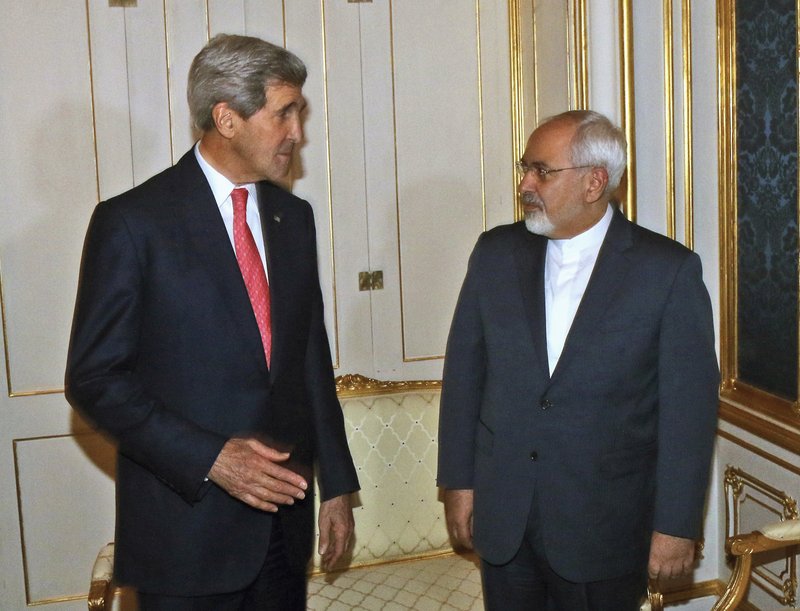WASHINGTON -- The Senate moved Thursday to renew a 20-year-old sanctions law that lawmakers said gives the United States the clout to punish Iran if it fails to live up to the terms of its nuclear deal.
Senators passed the bill 99-0, two weeks after the House also approved the legislation by an overwhelming 419-1 -- both veto-proof margins.
The bill to grant a 10-year extension of the Iran Sanctions Act will be sent to President Barack Obama, who planned to sign it.
The White House deemed the bill unnecessary but said it didn't violate the international accord intended to slow Iran's ability to make nuclear arms.
Seeking to address Iran's concerns, White House officials emphasized that the administration can and will waive all of the nuclear-related sanctions included in the renewal.
The officials weren't authorized to comment by name and spoke on condition of anonymity.
Lawmakers view the sanctions law, which is to expire at the end of the year, as an important tool for holding Iran accountable for any violations of the nuclear agreement and also as a bulwark against Tehran's aggression in the Middle East.
The law, first passed by Congress in 1996 and renewed several times since then, allows the U.S. to slap companies with economic sanctions for doing business with Iran.
In exchange for Iran rolling back its nuclear program, the U.S. and other world powers agreed to suspend wide-ranging oil, trade and financial sanctions that had choked the Iranian economy. The White House has been concerned that renewing the sanctions could give Iran an excuse to scuttle the deal by saying the U.S. had reneged on its commitments to sanctions relief.
Iran's supreme leader, Ayatollah Ali Khamenei, said last month that the extension of the Iran Sanctions Act would threaten the multilateral nuclear pact passed last year.
He threatened that Iran would respond if the extension became law -- putting veto pressure on the Obama administration, which believes the president has sufficient authority to punish Iran without an extension of congressional sanctions.
White House officials said Thursday that Obama remained fully committed to implementing the deal and that the act's renewal would have no effect on the sanctions relief Iran is receiving.
The White House argued against extending the law by stressing that the president already has "substantial authorities" to sanction the Iranian regime for bad behavior -- such as a recent spate of ballistic missile tests that U.S. officials believe run counter to the spirit, if not the letter, of the Iranian nuclear deal.
"We retain substantial authority to impose additional sanctions if they are warranted," White House spokesman Josh Earnest said Wednesday. He added, however, that if Obama does sign the bill, it would not be the first time "where the President has signed into law bills that Congress has passed that we're not sure are entirely necessary."
Congressional Republicans and Democrats view the law as valuable leverage and criticized the Obama administration for not being tougher with Iran.
Senate Majority Leader Mitch McConnell, R-Ky., said Thursday that preserving the sanctions law is critical to blunt Iran's "persistent efforts to expand its sphere of influence" throughout the Middle East. He also criticized the administration for allowing itself to be "held hostage" by Iran's threats to withdraw from the nuclear agreement.
The Republican chairman of the Senate Foreign Relations Committee, Bob Corker of Tennessee, said renewing the law will ensure that President-elect Donald Trump can reinstate sanctions that the Obama administration lifted to implement the Iran nuclear deal.
Corker, who has been mentioned as a candidate to be Trump's secretary of state, said he is in favor of appointing a U.S. official who would "radically enforce" the nuclear agreement. He also held out the possibility that the deal could be renegotiated once Obama leaves office.
"My guess is, if cooperation doesn't ensue relative to really enforcing this, significant changes will occur very rapidly," Corker said.
However, several world powers signed on to the deal and have showed no signs of backing away.
Congress approved the Iran Sanctions Act 20 years ago to block major foreign investment in Iran's energy sector. The goal was to deny Tehran the ability to financially support terrorism, and build nuclear and ballistic missile capabilities.
Sen. Ben Cardin of Maryland, the senior Democrat on the Senate Foreign Relations Committee, has argued that keeping the law on the books is necessary if the U.S. wants to retain "a credible deterrent" of putting sanctions back into place should Iran cheat on its obligations under the nuclear agreement.
The future of the nuclear agreement with Iran is one of the major looming foreign-policy questions facing the Trump administration. During the campaign, Trump pledged to dismantle the agreement, which he described as "the stupidest deal of all time" in the last presidential debate.
Some hope that Trump will change course. In an interview published Wednesday, departing director of the CIA John Brennan said that ending the nuclear agreement would be "disastrous" and "the height of folly."
Information for this article was contributed by Richard Lardner, Josh Lederman and Mary Clare Jalonick of The Associated Press; by Karoun Demirjian of The Washington Post; and by Thomas Kaplan and Julie Hirschfeld Davis of The New York Times.
A Section on 12/02/2016
